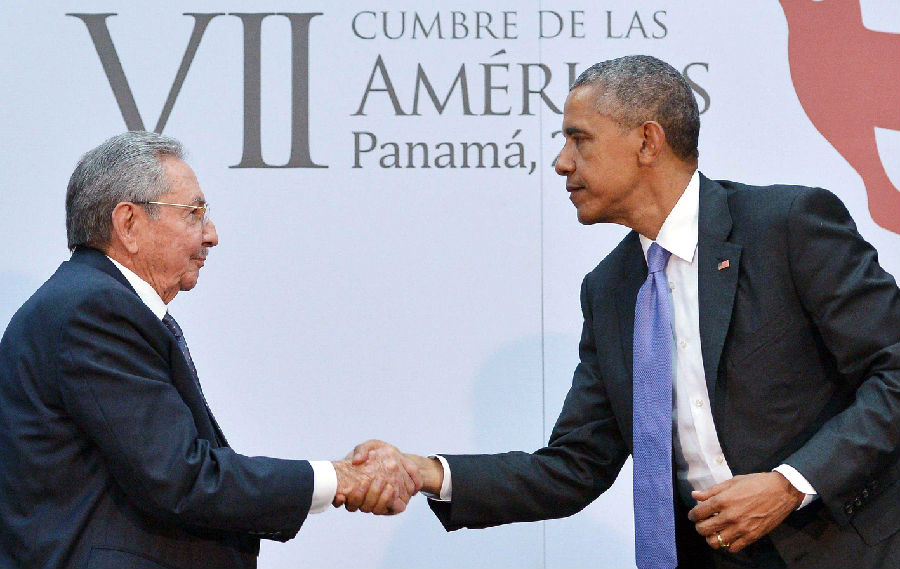America is opening up relations with Cuba, and it's a big deal, ending decades of hostility, and beginning a new era between the two countries.
美国和古巴正在恢复邦交,这一举措结束了数十年来两国互相敌对的局面,开启了两国外交的新篇章,这无疑是一件了不起的大事。
But to understand just how big of a deal , where that hostility really came from,and why it took so long to end,
然而,要了解这事究竟有多了不起,了解两国敌对的根源以及这种局面为何到今天才结束,
you've go to go back — way back, not to the 1950s as many Americans think, but to the 1850s.
故事还要从以前——很久很久以前说起,许多美国人都以为是上个世纪五十年代的事,其实我们可以一直追溯到19世纪五十年代。
The story starts with America divided between pro-slavery and anti-slavery politics.
一开始,美国就有支持奴隶制和反对奴隶制两种声音。
And one of their many fights is over the Spanish colony of Cuba.
为此引发了多次战争,其中一次就发生在西班牙属古巴的地面上。
Pro-slavery lawmakers want to buy Cuba from Spain, or take it by force, to turn into a new slave state.
支持奴隶制的国会议员们想把古巴从西班牙手中买过来或者干脆抢过来,把古巴变成新的奴隶制国家。
Anti-slavery politicians oppose this, calling it imperialism.
而反对奴隶制的政客们则反对这一做法,声称这是帝国主义作派。
In 1898, after slavery ends, Americans have a different version of this argument again, when Cubans rise up against Spain.
1898年,废除奴隶制以后,古巴开始反抗西班牙的殖民,美国在这一问题上的争论也随之发生了变化。
The US joins them, starting the Spanish-American war.
美国介入了两国的纠纷,导致美西战争爆发。
But Americans divide: should the US seize Cuba from Spain for itself, or liberate it?
但美国人也很纠结:是应该把古巴从西班牙手里救出来捏在自己手里,还是应该解放古巴?
This is part of a much bigger debate at the time over whether the US should explicitly become a European-style imperial power.
这一分歧其实不过是当时美国面临的一个更大的问题的一个分支,那就是美国是否要公然成为一个欧式帝国?
So this is an argument about Cuba, but it's also an argument about America and what kind of country it should be.
也就是说,这一争论不仅是古巴的问题,也是美国自身——事关美国国体——的问题。
Should America be the kind of country that controls Cuba, or that respects it as a fellow sovereign nation?
美国是要走控制古巴的路线,还是尊重其他国家主权的路线?
That argument has continued, in different forms, ever since. At this point, in 1898, the fight happens in Congress.
从那以后,即便形式有所转变,这一争论一直都没停息。 1898年连国会也出现了分歧。
Each side passes laws trying to force their way.
为了强行执行自己的方案,国会中两派都通过了自己的法律。
It ends with a weird split-baby policy, with Cuba winning independence, but under quasi-imperial rule.
于是就有了奇怪而各执一词的政策,古巴刚得到解放,就又落入了准帝国主义的统治之下。
The US would take over Guantanamo Bay, dictate Cuba's foreign policy, and give itself the right to intervene in Cuban affairs.
美国控制了关塔那摩湾,把持了古巴的外交政策,还赋予了自己干涉古巴内政的权利。
Then come the next American interventions in Cuba, in 1906 and 1917.
接着,1906年到1917年间,美国反复介入古巴政务。
Each time, the US military takes over for a few years, ostensibly to resolve some political crisis,
每次都会派美军到古巴驻扎几年,表面上则是为了解决古巴的政治危机,
but that usually means protecting American interests, such as sugar imports.
其实通常都是为了维护美国的自身利益,比如控制糖的进口。
Today, when Americans think about the US and Cuba, we think of the Cold War, but Cubans often think back to this imperial era.
今天,想到美国和古巴,我们首先想到的是冷战,但古巴人首先想到的却是美国奉行帝国主义的这段历史。
That era technically ends in 1933, with an uprising against Cuba's government.
严格来讲,这一时期直到1933年古巴发生政变才结束。
Under US law, America is supposed to intervene again,
按照美国法律,美国应该介入此次政变,
but President Franklin Roosevelt want to end America's imperial era, so he declares neutrality.
但富兰克林·罗斯福总统想结束美国的帝国时代,所以他表达了中立的态度。
Over the next 20 years, Cuba becomes a democracy, and one that's generally friendly with the US.
在接下来的二十年里,古巴变成了一个民主国家,一个基本上和美国和平相处的国家。
That changes in 1952, when a former president and military leader named Fulgencio Batista seizes power in a coup,
然而,1952年,这一局面终被打破:古巴前总统富尔亨西奥·巴蒂斯塔将军发动政变夺取了古巴政权,
suspends the constitution, and imposes an increasingly oppressive rule.
暂停宪法,对古巴实行了日益严苛的统治。
Cuba's Communist uprising begins the next year, led by a young Fidel Castro.
次年,古巴共产主义革命爆发,领导人是一位名叫菲德尔·卡斯特罗的年轻人。

American politics at this point is obsessed with fears of communism, so the US backs Batista in the war, no matter how brutal he becomes.
此时美国政治对共产主义充满恐惧,所以美国在这场战争中选择了支持巴蒂斯塔,尽管他是那么的残暴。
For Americans, this feels like a front in the struggle against communism.
对美国人来说,支持巴蒂斯塔就像是守住反对共产主义的防线。
But for Cubans, it feels like Batista is an extension of American imperialism,
然而,在古巴人看来,巴蒂斯塔却是美帝国主义的魔爪,
and the guerrilla war a continuation of their long fight for freedom.
独立战争便是他们长期争取自由过程中的又一次斗争。
The communists win in 1959 and Castro takes power.
1959年,古巴共产党赢得战争,卡斯特罗掌握了古巴政权。
The US, fearing communism's expansion, sets up the embargo to strangle Cuba's economy,
美国,因为害怕共产主义蔓延,封锁了古巴的进出口贸易,企图扼杀古巴的经济,
tries to assassinate Castro, and even in the disaster known as Bay of Pigs, sends in CIA-trained Cubans to try to take over the island.
伺机暗杀卡斯特罗,甚至还派CIA训练的古巴人占领古巴,也就是历史上所谓的“猪湾事件”。
Castro turns to the Soviets for help,
卡斯特罗转向苏联求助,
and in 1962 they nearly start World War Three when the US blocks Soviet efforts to put nuclear missiles in Cuba.
1962年,美国阻止苏联往古巴输送核导弹,为此还差点引发了第三次世界大战。
The incident scares everyone enough that things settle into a tense but peaceful status quo.
这可把大家都吓坏了,所以大家暂时进入了一段紧张但基本还算平静的关系。
Over time, ordinary Cubans are squeezed between the US embargo and Castro's dictatorship.
随着时间的推移,古巴的百姓被迫夹在美国的封锁以及卡斯特罗的统治之间。
In 1980, Castro tries to relieve some political dissent by briefly allowing Cubans to leave the island, and 125,000 arrive in Florida.
1980年,卡斯特罗决定允许他的反对派短时间走出古巴,以此来缓解政治分歧,于是12.5万人来到了弗罗里达。
No one realizes it at the time, but this adds a completely new dimension to the conflict.
这一举措将给双方的冲突蒙上另一层阴影,然而当时并没有人意识到这一点。
It's now also about the internal Cuban battle between Castro and Cuban dissidents, which plays out through American politics.
现在两国的冲突还牵涉到了卡斯特罗和反对卡斯特罗的古巴人之间的斗争,而这一斗争会一直影响美国的政治。
This becomes really important in the 1990s.
这一作用到了九十年代变得尤为重要。
After the Soviet Union collapses, President Clinton, seeing Cuba poses no threat, wants to end the conflict.
苏联垮台以后,克林顿总统眼看着古巴已经威胁不到美国了,就打算结束两国之间的纷争。
So does Castro, who can't count on Soviet aid any more.
卡斯特罗也这么想的,因为他已经指望不上苏联了。
But Cubans in America, who suffered terribly at Castro's hand, want to see him fall, and push for keeping the embargo.
但美国境内曾经惨遭卡斯特罗镇压的古巴人想推翻卡斯特罗,便强烈支持美国继续对古巴实行封锁。
In 1996, Cuba shoots down two private planes chartered by Cuban-American activists.
1996年,古巴击落了载着古巴籍美国人的两架私人飞机。
There's a big backlash in the US, and Clinton backs down.
为此美国出现了强烈反对的声音,克林顿不得不做出让步。
20 years later, President Obama tries again to end the conflict.
二十年后,奥巴马总统也为结束两国冲突付出了努力。
By now, Americans don't really support the embargo.
到那时为止,美国人普遍已经不支持封锁了。
Lots of Cuban-Americans are now economic migrants, rather than political exiles, so they want openness.
很多古巴籍美国人的身份也都变成了经济移民,再不是政治流放者了,所以他们希望开放古巴。
Fidel is getting old, and in 2008 hands power to his brother Raul, who knows the country needs to change.
菲德尔也老了,他于2008年将政权移交给了他的弟弟劳尔,劳尔心里清楚,这个国家是时候改革了。
The US and Cuba start secret talks in 2013.The new Pope, Francis, helps negotiate.
美国和古巴于2013年开始展开秘密会谈,由新任大主教弗朗西斯从中协调。
In 2014, they reveal their agreement to end the conflict,
2014年,双方公开了结束纷争的协议,
and the next year Obama becomes the first president to visit since Calvin Coolidge in 1928.
次年,奥巴马成了既1928年卡尔文·库利奇总统访问古巴以来首位出访古巴的美国总统。
The US and Cuba have never really had "normal" relations until now,
在此之前,美国和古巴的外交关系从未步入正轨过,
and that's crucial to understanding why it took so long for this to happen.
了解了这一点,我们才能理解为何两国过了这么久才能冰释前嫌。
So much has passed between the two countries over the past century,
在过去的一个世纪,两国都发生了巨大的变化,
and the US has at times treated Cuba as more of a colony than a real country. It's a lot to get over.
美国很多时候都是把古巴当作殖民地而非一个真正的国家在对待,所以转变起来谈何容易。
But it looks like they might both finally be ready.
但貌似两国现在已经准备好迎接新时代了。












